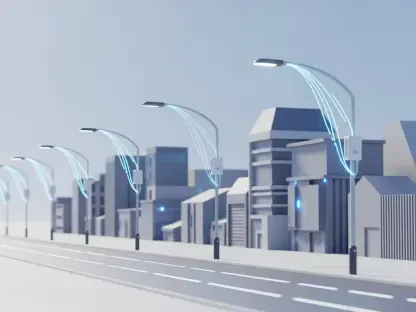Türkiye stands at the threshold of a technological revolution with the impending rollout of 5G networks, a development poised to dramatically alter the landscape of the country’s mobile market and redefine connectivity. This next-generation wireless technology promises to deliver data speeds that dwarf current standards, alongside connectivity that could reshape how people and industries interact with digital platforms. As global trends push toward advanced telecommunications, Türkiye’s embrace of 5G has the potential to establish the nation as a frontrunner in regional innovation, setting a benchmark for others to follow. The implications of this shift extend far beyond mere improvements in internet speed, touching on economic growth, societal advancements, and even privacy concerns in an increasingly connected world.
The transformative power of 5G lies in its ability to support a vast array of applications, from enhancing consumer experiences to revolutionizing industrial operations. With the capability to connect an unprecedented number of devices simultaneously, this technology is expected to fuel the expansion of the Internet of Things (IoT), linking everything from household gadgets to complex industrial systems. However, alongside the excitement, significant challenges loom on the horizon, including the need for substantial infrastructure investments and the pressing issue of cybersecurity. This article delves into the multifaceted impact of 5G on Türkiye’s mobile sector, exploring both the opportunities it presents and the obstacles that must be navigated for a successful implementation.
Unleashing Technological Potential
Speed and Connectivity Boost
The defining feature of 5G technology is its remarkable speed, which is set to transform mobile interactions across Türkiye. Capable of achieving data transfer rates up to 100 times faster than 4G, this advancement means that tasks such as downloading high-definition movies or large files will take mere seconds. For consumers, this translates to seamless streaming of 4K content and a significantly enhanced browsing experience, free from the frustration of buffering. Mobile operators are likely to see a surge in demand for data-intensive services as users embrace these capabilities, pushing the market to evolve rapidly to meet new expectations. This leap in speed is not just a convenience but a catalyst for broader digital adoption across urban and rural areas alike.
Beyond raw speed, 5G’s enhanced connectivity promises to support a massive number of simultaneous connections without compromising performance. This feature is particularly significant in densely populated urban centers of Türkiye, where network congestion has often been a bottleneck. The ability to handle such scale ensures that events like concerts or sports matches, where thousands access networks at once, will no longer suffer from dropped signals or slow data rates. Additionally, this connectivity paves the way for smart city initiatives, enabling real-time data sharing for traffic systems and public services. As Türkiye moves toward integrating these technologies, the mobile market will likely shift to prioritize services that leverage this robust network capacity.
Low Latency and Real-Time Applications
One of the most groundbreaking aspects of 5G is its ultra-low latency, which reduces response times to near-instantaneous levels, a feature poised to unlock new possibilities in Türkiye. This characteristic is critical for applications requiring split-second decisions, such as online gaming, where lag can disrupt the user experience. More importantly, it holds transformative potential for fields like healthcare, where remote surgeries conducted via robotic systems demand flawless, real-time communication. The deployment of 5G could position Türkiye at the forefront of medical innovation, allowing specialists to perform complex procedures from afar with unprecedented precision, ultimately improving patient outcomes.
Furthermore, low latency will revolutionize industries that rely on immediate data transmission, such as autonomous vehicle technology. In Türkiye, the development of self-driving cars and smart transportation networks could accelerate with 5G, as vehicles communicate with each other and infrastructure in real time to prevent accidents and optimize traffic flow. This technology also supports advanced augmented reality (AR) applications, which could enhance training programs in various sectors by providing immersive, responsive simulations. As these applications become mainstream, mobile operators in Türkiye will face pressure to develop tailored plans and partnerships to support such cutting-edge uses, reshaping the competitive dynamics of the market.
Economic and Societal Shifts
Driving Economic Growth
The rollout of 5G in Türkiye is anticipated to act as a powerful engine for economic expansion, injecting vitality into multiple sectors through infrastructure development and job creation. Building the necessary network of base stations, small cells, and fiber-optic lines requires significant investment, which in turn generates employment opportunities in engineering, construction, and technology fields. This surge in activity could stimulate local economies, particularly in regions involved in the deployment process. Moreover, the enhanced connectivity is likely to make Türkiye an attractive destination for global tech companies, potentially drawing foreign direct investment and fostering collaborations that elevate the nation’s position in the international tech landscape.
Additionally, the economic ripple effects of 5G extend to the growth of ancillary industries that support telecommunications. For instance, the demand for advanced hardware, such as 5G-compatible devices and IoT equipment, will likely spur manufacturing and retail sectors within Türkiye. Small and medium-sized enterprises could also benefit by leveraging faster networks to expand their digital presence and compete on a larger scale. However, to maximize these economic gains, policymakers will need to ensure that regulatory frameworks facilitate swift deployment while maintaining fair competition among operators. The potential for 5G to drive economic progress hinges on strategic planning and the ability to address financial and logistical challenges head-on.
Revolutionizing Industries
Industries across Türkiye stand to undergo a profound transformation with the advent of 5G, as its capabilities enable unprecedented levels of efficiency and innovation. In manufacturing, the technology can power smart factories where machinery and systems communicate in real time, optimizing production processes and minimizing downtime through predictive maintenance. This shift could significantly boost productivity, positioning Türkiye as a competitive player in global supply chains. Additionally, sectors like logistics could see improvements with IoT-enabled tracking and automated warehousing, reducing costs and enhancing delivery speeds for businesses and consumers alike.
In the transportation sector, 5G’s low latency and high connectivity are set to pave the way for autonomous vehicles and intelligent traffic management systems. Cities in Türkiye could implement real-time data analysis to alleviate congestion, reduce accidents, and improve public transit efficiency, contributing to safer and more sustainable urban environments. Furthermore, the healthcare industry might experience a revolution with telemedicine platforms that rely on high-speed, reliable connections for virtual consultations and remote diagnostics. These industrial advancements, while promising, will require substantial collaboration between technology providers and sector-specific stakeholders to ensure seamless integration and address any skill gaps in the workforce.
Impacts on Society and Consumers
Bridging the Digital Divide
One of the most profound societal benefits of 5G in Türkiye lies in its potential to bridge the digital divide, bringing high-speed internet to underserved rural communities. Historically, remote areas have struggled with limited connectivity, hindering access to essential online services such as education, healthcare, and e-commerce. With 5G’s ability to cover wide areas through advanced network infrastructure, these regions could finally tap into the digital economy, empowering residents with tools for learning and entrepreneurship. This inclusivity is a critical step toward reducing disparities and fostering equal opportunities across the nation, ensuring that technological progress benefits all segments of society.
Moreover, improved connectivity in rural Türkiye could transform agricultural practices through precision farming techniques enabled by IoT devices. Farmers might utilize sensors and real-time data to monitor soil conditions, optimize irrigation, and increase crop yields, thereby boosting rural economies. Such advancements would not only enhance livelihoods but also contribute to national food security. However, achieving this vision will depend on targeted investments and policies that prioritize rural deployment alongside urban centers. By addressing these challenges, 5G has the potential to create a more connected and equitable society, narrowing the gap between different regions and demographics.
Changing Consumer Expectations
As 5G introduces cutting-edge services like augmented reality and ultra-high-definition streaming, consumer expectations in Türkiye are set to rise significantly. Users will likely demand more immersive and interactive experiences, from virtual reality gaming to personalized content delivery, pushing mobile operators to innovate at an accelerated pace. This shift could lead to a proliferation of tailored data plans and subscription models designed to cater to diverse needs, as companies like Turkcell, Vodafone Türkiye, and Türk Telekom vie for market share. The pressure to deliver seamless, high-quality services will redefine customer relationships within the mobile sector.
Additionally, the advent of 5G may alter how consumers perceive value in mobile services, with a growing emphasis on reliability and versatility over mere affordability. As smart home devices and wearable technology become more integrated into daily life, users will expect their networks to support an ecosystem of connected gadgets without interruptions. This evolving demand will challenge operators to balance innovation with accessibility, ensuring that the benefits of 5G are not limited to tech-savvy or affluent demographics. Public education campaigns may also play a role in shaping perceptions, helping to dispel myths about 5G and highlighting its practical advantages for everyday life.
Navigating Obstacles and Risks
Infrastructure and Cost Barriers
Implementing 5G across Türkiye presents a formidable challenge due to the immense infrastructure requirements and associated costs. Establishing a comprehensive network demands the installation of thousands of new base stations, small cells, and extensive fiber-optic backhaul systems, a process that requires substantial financial resources. For mobile operators, the burden of these expenses could strain budgets, potentially leading to higher service costs for consumers if not managed carefully. Government support through subsidies or incentives might be necessary to offset these costs and ensure that the rollout progresses without significant delays.
Moreover, the logistical complexities of deploying 5G infrastructure in diverse terrains, from bustling urban centers to remote rural areas, add another layer of difficulty. Coordinating with local authorities for permits and land use, alongside managing public concerns about tower placements, could slow down the process. To mitigate these barriers, a collaborative approach between public and private sectors will be essential, focusing on strategic planning to prioritize high-impact areas while maintaining affordability. Without such efforts, the risk of uneven deployment could exacerbate existing digital inequalities, undermining the broader goals of technological advancement in Türkiye.
Cybersecurity Risks
The expansion of 5G networks in Türkiye, while promising enhanced connectivity, also amplifies the risk of cybersecurity threats due to the sheer volume of connected devices. As IoT ecosystems grow, encompassing everything from smart appliances to critical infrastructure, the potential entry points for cyberattacks multiply, posing significant challenges to data security. Hackers could exploit vulnerabilities to access sensitive information or disrupt essential services, making robust protective measures a top priority. Mobile operators and government agencies will need to invest in advanced encryption and monitoring systems to safeguard users and systems.
Additionally, the interconnected nature of 5G networks means that a breach in one area could have cascading effects across multiple sectors, from healthcare to transportation. Developing comprehensive cybersecurity frameworks, including regular updates and threat assessments, will be crucial for maintaining trust in the technology. Public awareness initiatives can also play a role by educating users on safe digital practices, such as recognizing phishing attempts or securing personal devices. Addressing these risks proactively will be vital to ensuring that the benefits of 5G are not overshadowed by security lapses, protecting both individual privacy and national interests in Türkiye.
Privacy and Digital Dimensions
Privacy in the Age of 5G
As Türkiye prepares for the widespread adoption of 5G, the intersection of advanced connectivity and digital tracking practices emerges as a pressing concern for user privacy. Online platforms discussing technological developments like 5G often employ extensive data collection tools, monitoring user behavior to tailor content and advertisements. With 5G enabling a higher volume of connected devices, from smartphones to IoT gadgets, the scale of personal data gathered could increase exponentially. This raises significant questions about how much information is collected, who has access to it, and whether users are adequately informed about these practices.
Furthermore, the rapid proliferation of data-driven technologies under 5G could outpace existing privacy regulations, leaving gaps in protection. For instance, smart city applications, while beneficial for urban management, might track individual movements or behaviors without clear consent mechanisms. Addressing these concerns will require transparent policies from both technology providers and regulatory bodies in Türkiye, ensuring that users retain control over their data. The potential for misuse or breaches underscores the need for stringent standards, as unchecked data collection could erode public trust in the very technology meant to advance societal well-being.
Balancing Innovation and Security
Striking a balance between the innovative potential of 5G and the imperative to protect user security presents a complex challenge for Türkiye. On one hand, the technology promises to drive progress across sectors, from enabling real-time industrial automation to enhancing consumer experiences with immersive applications. On the other, the expanded digital footprint increases exposure to privacy risks, as data collected through connected devices becomes a valuable target for exploitation. Crafting a framework that supports technological growth while safeguarding personal information will be essential to maintaining public confidence in the rollout.
Moreover, international collaboration could offer valuable insights for Türkiye, as global standards for data protection evolve alongside 5G adoption. Learning from best practices in regions with mature 5G networks might help in developing robust legislation that addresses both current and future privacy challenges. Encouraging industry accountability through mandatory data minimization practices and regular audits can further mitigate risks. Ultimately, the successful integration of 5G will depend on a proactive approach to security, ensuring that innovation does not come at the expense of fundamental rights, and that Türkiye navigates this dual landscape with foresight and responsibility.
Reflecting on the Path Forward
Looking back, the journey toward 5G adoption in Türkiye revealed a landscape brimming with potential, as the technology showcased its capacity to elevate connectivity and spur economic vitality. The remarkable speed, low latency, and expansive device connectivity offered by 5G stood as pillars of transformation, impacting everything from consumer habits to industrial efficiency. Despite these advancements, hurdles such as infrastructure costs and cybersecurity threats underscored the complexity of the rollout, demanding meticulous attention from all stakeholders involved. The societal benefits, particularly in bridging digital divides, highlighted a vision of inclusivity that shaped discussions around equitable access.
Moving ahead, actionable steps must focus on fostering collaboration between government bodies and private enterprises to streamline 5G deployment. Establishing clear regulatory guidelines for spectrum allocation and infrastructure sharing could accelerate progress while ensuring fair competition. Simultaneously, investing in cybersecurity infrastructure and public education on digital safety will be critical to address privacy concerns amplified by increased connectivity. By prioritizing these initiatives, Türkiye can harness the full spectrum of 5G’s benefits, paving the way for a future where technological innovation and user security coexist harmoniously, setting a model for sustainable digital growth.









